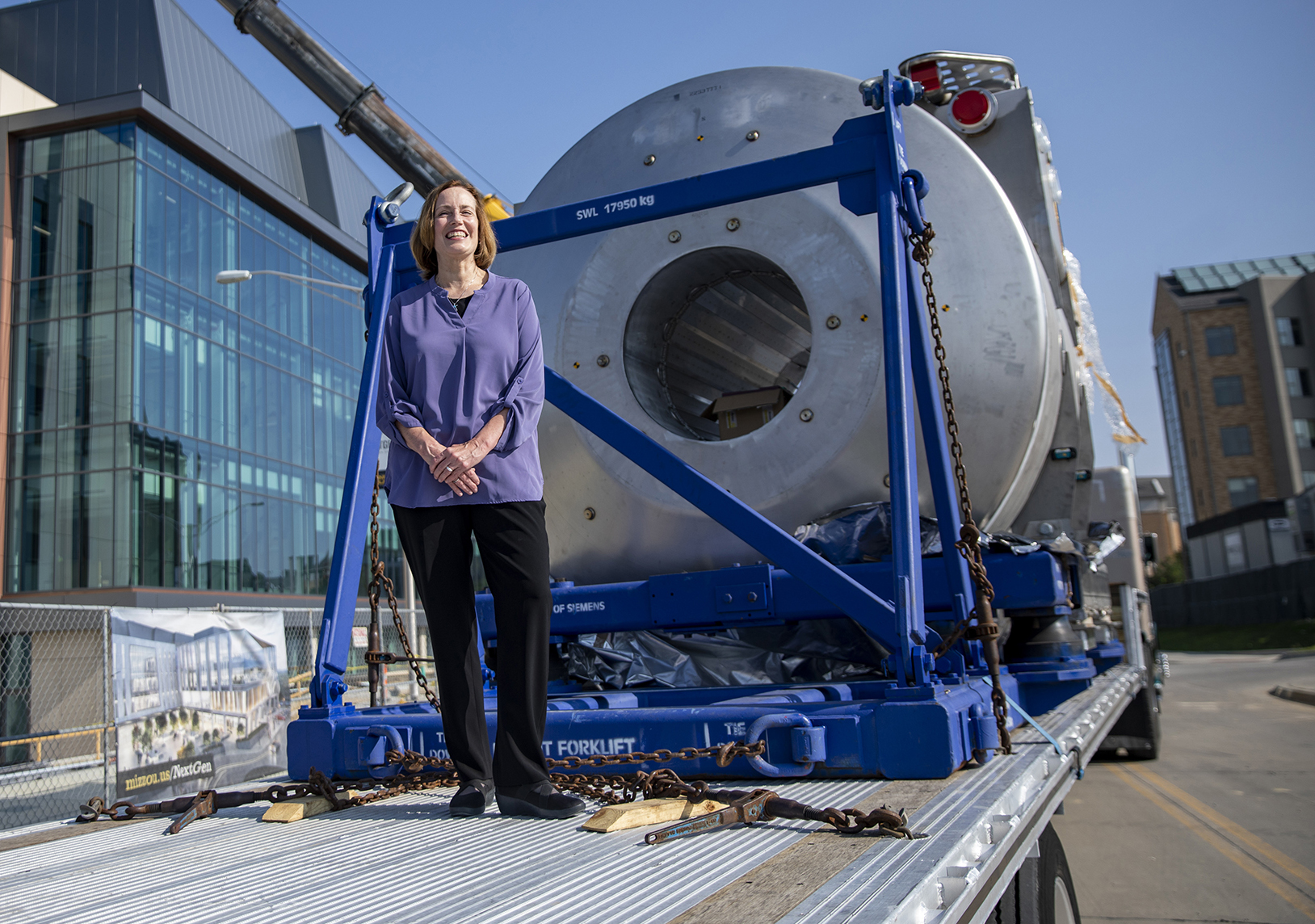Breadcrumb
The Future of Health Care, Now
Medical advances belong in the hands of doctors, patients and the greater community, not on a laboratory shelf. The NextGen Precision Health building is accelerating precision health research and development by coordinating the work of scientists, clinicians, community organizations, industry leaders and federal and state agencies so they can collaborate to streamline the process of developing solutions for patients.
Cancer and Immunology
Every hour about four new cases of cancer are diagnosed in Missouri. University of Missouri investigators are developing new ways to prevent, find, image and treat cancers with drugs and patients’ immune systems to transform the future of health care. Researchers are focusing on personalized immunotherapy, which considers an individual's immune system status, genetic makeup and disease stage to allow for tailored prevention and treatment. They are also deploying novel new treatments for Type 1 diabetes, such as the transplantation of insulin-producing pancreas cells from a donor to a recipient. Additional research is examining how to bolster the immune system to prevent or treat disease.
Cardiovascular and Metabolic Disorders
Cardiovascular disease is the leading cause of death in Missouri and worldwide, with obesity and diabetes representing the primary instigators. Renewed and intensified research efforts are required to lessen this colossal burden. Researchers are examining the biological mechanisms resulting from the Western diet that stimulate certain gut bacteria and promote nonalcoholic fatty liver disease (NAFLD), which affects 25% of the global population. Others focus on understanding the mechanisms of vascular endothelial dysfunction with regard to obesity, Type 2 diabetes, insulin resistance, hypertension and aging. MU investigators are using state-of-the-art high-resolution imaging, molecular and functional measures, genetic manipulations and computational modeling to develop novel, patient-based strategies for preventing and treating cardiovascular and metabolic diseases.
Data Science
Machine learning techniques, combined with patient-friendly data visualization methods, are reshaping the capabilities of health science. NextGen researchers are incorporating deep learning to analyze data from sources like radiological or microscopy images, empowering them to identify, segment and track the lineage of cells, to build hypotheses about diseases like cancer or neurological disorders, and to predict and analyze protein structure and function. With unprecedented visibility into the molecular mechanisms underlying diseases, investigators can design new pharmaceutical treatments with greater confidence that they will succeed in clinical trials, expediting delivery for the patients who need them.
Neuroscience
Many Missourians are affected by nervous system disorders, and NextGen neuroscientists are developing new ways to use brain imaging and neural devices to understand and treat brain disorders, as well as train the next generation of neuroscientists. These researchers are leveraging and unifying MU’s strengths in animal modeling, engineering, psychology and more to tackle addiction, neurodegenerative and neuromuscular disease (such as spinal muscular atrophy), motor deficits, sleep disorders and other critical brain health issues. Understanding the mechanisms behind age-related physiological decline and developing strategies to slow or reverse that impact will extend patients’ “health span.”
Reproductive Health
NextGen researchers are investigating tailored treatment and care based on a patient’s unique genetic, biochemical and clinical characteristics to transform all aspects of reproductive health, such as addressing infertility challenges to improve the success rate of fertility treatments and optimize pregnancy outcomes. They are developing novel non-hormonal contraceptive methods for both men and women, reducing side effects. In addition, MU scientists are making strides with research involving the treatment and detection of various reproductive cancers and disorders, such as ovarian cancer.
Biomaterials Engineering
Engineering is vital to precision health as engineers develop home sensors that monitor health conditions, design biomaterials for novel treatments and analyze and interpret medical images. NextGen engineers are researching innovative biomaterials, cancer detections and treatments, and providing expertise on computing infrastructure, bioinformatics and data analytics to help translate crucial lab research into life-changing interventions, medicines, technologies and treatments.
Imaging
State-of-the-art NextGen imaging equipment is helping clinicians detect the source of health problems earlier and provide more precise treatment. NextGen scientists are exploring the frontiers of imaging research, such as magnetic resonance imaging, radiopharmaceutical development and nanomedicine with world-class tools and equipment available through a 10-year alliance with Siemens Healthineers. These enhanced imaging capabilities are at the center of NextGen’s research of Alzheimer’s disease, brain tumors, Parkinson’s disease and epilepsy.
